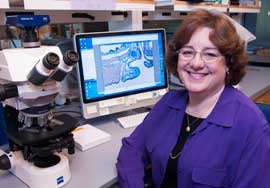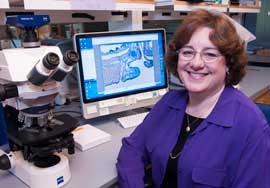 KINGSTON, R.I. – September 10, 2013 – Jacqueline Webb, professor of biological sciences at the University of Rhode Island, was the recipient of a Laura and Arthur Colwin Endowed Summer Research Fellowship from the Marine Biological Laboratory (MBL) in Woods Hole, Mass., which enabled her to spend the summer at the MBL with 120 other visiting scientists from around the world conducting marine research.
KINGSTON, R.I. – September 10, 2013 – Jacqueline Webb, professor of biological sciences at the University of Rhode Island, was the recipient of a Laura and Arthur Colwin Endowed Summer Research Fellowship from the Marine Biological Laboratory (MBL) in Woods Hole, Mass., which enabled her to spend the summer at the MBL with 120 other visiting scientists from around the world conducting marine research.
Webb, a resident of Wakefield, was the first URI professor to be a summer investigator at the MBL in several decades.
“I studied at the MBL in graduate school, and spent last summer there at the start of my sabbatical,” Webb said. “Receiving an MBL research fellowship this past summer was a great honor. The tremendous intellectual energy generated at the lab is quite inspiring and I hope to return in future summers to continue my work.”
Webb spent her time working on the development and evolution of the lateral line system of fishes, the subject of her research for more than 25 years.
Found in all fishes, the lateral line system is a sensory system that allows fish to detect minute water flows and low frequency vibrations in water. According to Webb, it plays a critical role in fish behavior, including the detection of prey and predators, communication, and navigation around obstacles in the dark. She said it may be familiar to anglers as the line of tubed scales that extends from the head to the tail, and the pores connected to lateral line canals on the lower jaw of fishes. These canals contain sensory receptor organs made up of sensory hair cells, just like those in the inner ear of humans, which allow fishes to detect flows and vibrations.
Webb’s summer fellowship project investigated the development of the lateral line system in a local species, the little skate. Skates lay their large fertilized eggs on the seafloor in leathery egg cases, inside which the embryos develop for many months before emerging as juveniles.
“The way the lateral line system develops in the little skate — and in all skates, rays and sharks — is quite different from how it develops in bony fishes,” Webb said. “It’s a distinction that arose more than 400 million years ago with the evolutionary origin of these major groups of animals.”
“The lateral line system may seem unfamiliar to us because it is not found in vertebrates that live on land, including humans, but it is found in all marine and freshwater fishes, and thus in more than half of all living vertebrate species,” she added. “My research is revealing the ways in which developmental biology can be used to understand the evolution of this sensory system among the 30,000-plus species of fishes.”
Webb conducted her research this summer in collaboration with Andrew Gillis of Dalhousie University in Nova Scotia, an expert on the embryology of elasmobranch fishes (sharks, skates and rays).
The Marine Biological Laboratory, which celebrated its 125th anniversary this summer, is equipped with a large, state-of-the-art, temperature-controlled marine aquaculture facility for the maintenance and rearing of large numbers of skate embryos and other marine species. Webb said that the MBL also provides unparalleled technical expertise in high tech microscopic imaging, making it the perfect site to carry out her work.
URI Department of Communications & Marketing photo by Michael Salerno Photography.

